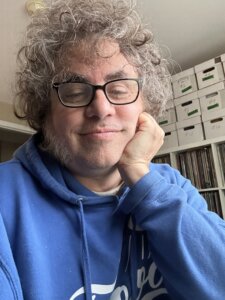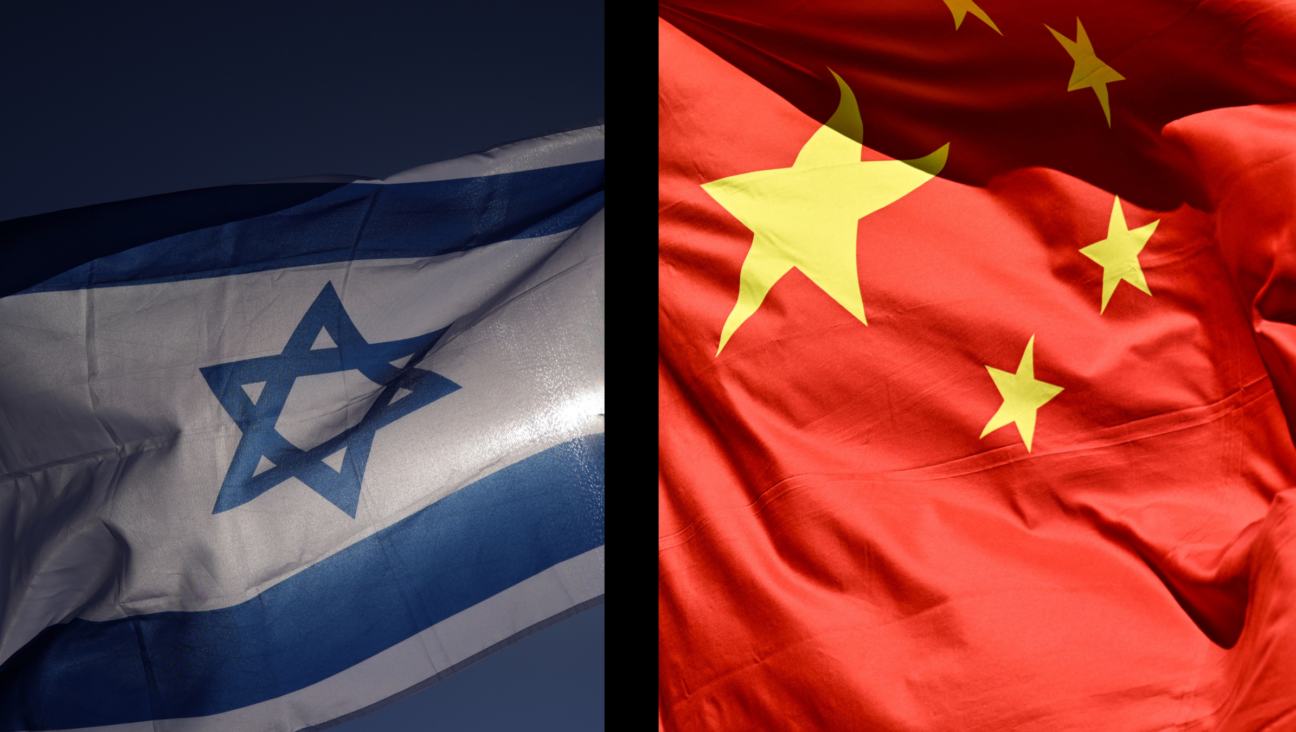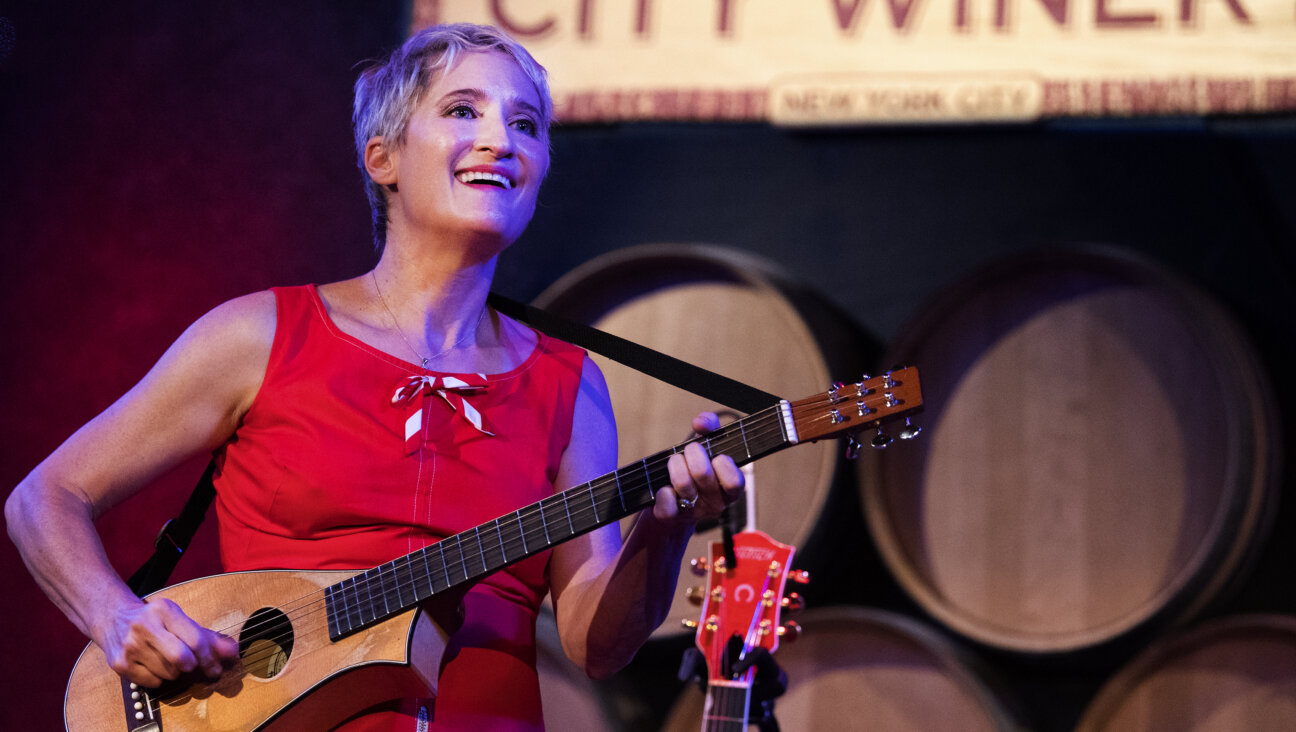Meet The Boston Red Sox Organist Who Got His Start At Shabbat Services

Fenway Park Image by Getty Images
Editor’s note: This story originally appeared on Jewishbaseballmuseum.com
Josh Kantor has performed everywhere from synagogues to orchestra pits, from seedy nightclubs to outdoor festival stages. But his favorite venue for playing music is Fenway Park, where he serves as the organist for the Boston Red Sox.
A pianist since the age of five, Kantor (now 44) fell in love with baseball during his childhood in Athens, Georgia; but hearing legendary White Sox organist Nancy Faust during a ballgame at Chicago’s old Comiskey Park alerted him to the possibility of combining his two passions. A graduate of Brandeis University, Kantor landed his “dream job” with the Red Sox in 2003, and hasn’t missed a home game since.
Like most ballpark organists, Kantor’s repertoire covers everything from early 20th century showtunes to contemporary pop hits, but what has really endeared him to the Fenway faithful is his openness to taking requests. Fans who tweet song suggestions to him (@jtkantor) during Red Sox games are often rewarded with a snippet of their request, while those who stop by his organ booth on the ballpark’s Club level will find an affable mensch who’s usually more than happy to talk about music and baseball. Kantor and Fenway DJ T.J. Connelly are also known for working specific musical themes into certain games, such as an all-Motown setlist whenever the Detroit Tigers are in town, or the memorable day game in April 2016 where they responded to the shocking news of Prince’s death by serving up an entire afternoon of the Purple One’s material.
In the off-season, as well as during breaks in the team’s home schedule, Kantor also performs and tours with a number of rock bands, including Jim’s Big Ego, the Split Squad and the Baseball Project. The latter band, which includes members of R.E.M., the Dream Syndicate, and the Minus Five, exclusively writes and plays songs about the myriad facets and joys of the National Pastime — so it makes perfect sense to have a genuine ballpark organist onstage with them.
“The guys and gal in The Baseball Project are all extraordinarily accomplished musicians who have played big and small places the world over,” Kantor says. “They’re like, ‘Yeah, we’ve had Number One records and won Grammys, but nobody else in the band wears a World Series ring onstage!’”
We caught up with Kantor during a rare day off to chat about baseball, music, and what it’s like to work where the two things intersect.

Josh Kantor, organist for the Boston Red Sox Image by Courtesy of Jewishbaseballmuseum.com
Which came first for you — baseball or music?
I guess it was music, though they both came pretty early. I was five when I started playing piano; and then I think I was seven when I started getting into baseball and watching games with my dad, who was (and still is) a lifelong, diehard Cubs fan. But we were living in Athens, Georgia at the time — he was teaching at the University of Georgia — so the Braves were kind of my team, and my dad would periodically take me and my brother to Braves games. This was in the early Dale Murphy era, and they were mostly not very good teams, but I loved watching them. And I played a lot of ball in the backyard, as well as t-ball and little league, and I avidly collected baseball cards from about age seven to age thirteen. But I was also really into playing music and listening to music. So, you know, I’m super lucky to have this job that combines two things I’ve loved since I was a kid, and still love!
You often talk about how much you were influenced by White Sox organist Nancy Faust. Was she the first ballpark organist you really paid attention to?
Yes, she was the first one where I really took notice. We moved to Evanston, IL when I was 14 — and all of a sudden it was like, “Oh, I can just hop on a train; I don’t need my parents to give me a ride to go to a ballgame!” I’d been to several Braves games, but I don’t even remember if they had a live organist at the time. But the first game I went to at the old Comiskey, I heard her playing, and it was just a revelation! She was playing all this clever, funny, whimsical kind of stuff. And my cousin, who’s a few years older and had been going there since he was little, he was like, “Oh yeah, that’s Nancy Faust!” He told me all about her. And then I discovered that her booth was in a publicly accessible area and you could talk to her, so I would go over there and hang out and watch her play, and try not to pester her too much. But I was a huge fan, and I was probably a little annoying!
But she was cool about it?
Oh, yeah. I asked her about it years later, like, “Do you remember me coming around?” And she was like, “No, I met a million people, and everyone was pretty friendly.” So I didn’t stick out in her memory from that time, but obviously she made a huge impression on me. Not just in the way she played, but in her demeanor and her personality, and the way she conducted herself. This idea that she was so accessible, and she wanted to interact with fans and take requests from fans — that was so eye-opening, and so ahead of its time, too. In effect, she was crowd-sourcing, before that was a term or concept that people understood.
Is the organ booth at Fenway similarly accessible to the public?
It’s relatively accessible. It’s in the State Street Pavilion Club, and if you have a ticket for one of the neighboring sections, you have access to come into this sort of restaurant/bar where I am. I’m sort of hidden in a corner, so most people don’t always know I’m there. But some people come specifically looking for me, and it’s always nice when they do. In recent years, it’s been more about being accessible online, so people who are at the games can tweet me messages and song requests. And it’s wonderful to interact with people like that; when you go to work every day at Fenway Park, you can sometimes forget a little bit what an esteemed and magical place it is for some people. But then you get reminded of it when people who tell you, “We live four hours away, and we come here once every year as a family. It’s a big deal for us.” It’s almost like a religious pilgrimage for a lot of people.
It’s definitely a rite of passage for many folks. I see people sending you tweets all the time like, “This is my girlfriend’s first visit to Fenway — can you play her favorite song for her?”
If I can do anything to enhance the specialness of the experience by playing a song for them, meeting them or showing them around, then it makes it more memorable for them — and memorable for me, as well. A lot of times it’s loose and fun and cool, but sometimes it’s really poignant: Just last week, I had someone who’d come to the game straight from his father’s funeral. He said, “My brother and I paid our respects in the morning, and then we came here in the evening to go to the game. This was my dad’s favorite place, and his favorite song was ‘Proud Mary’.” And I was honored to be able to play “Proud Mary” for them in that moment, and then meet them and chat with them and show them around…And there was a couple from Manchester, England, who was visiting this country for the first time. They had been away from Manchester when the bombing happened, and they felt torn about not being home at a time when all their friends and family were going through this very difficult period. They asked, “Could you play a song from the old Manchester scene? We grew up with that.” So I played a Smiths song, and then I got to meet with them afterwards and show them around. On some level, it’s a little thing; but it’s also a little emotionally overwhelming to realize that I’m in this position to have this forum where I can do these kind things for people — just to play a song that somebody likes, and have it really mean something to them.
You clearly have a broad repertoire — but what do you do when someone asks for something you don’t know how to play?
That’s a good question. I’ve been doing this for 15 years now, so I’m certainly better at this than I was 15 years ago. And playing by ear was certainly something I had a lot of training in, growing up and playing in different bands, playing in orchestra pits for musical theater. In college, I did a lot of live piano accompaniment for improvisational theater, which is a very transferable skill to the ballgame, because you’re watching players onstage, and you don’t know exactly what’s going to happen next — and you have to respond with a musical idea to whatever comes forth. All of which is a long way of getting to your question. But yeah, sometimes I’ll get a request for a song that I’ve never played before, or I haven’t heard it in thirty years, or I’ve never even heard it before — and real quick, I’ll pull up a stream of that song on my laptop, give it a listen, and just pick out the melody and the hook, or try to get the chorus. I’m not usually playing a song for more than about twenty or thirty seconds; the longest I’ll usually play a song is for two minutes, during a full commercial break. But I just try to find a way to make the song work as an instrumental, and emphasize the part that people will sing or hum along with.
In addition to Nancy Faust, were there any other musicians who had a major influence on what you do as a ballpark organist?
When I was in high school, I lived down the street from the synagogue, Beth Emet, where Jeff Klepper served as Cantor. I didn’t know at the time that Jeff is a luminary in modern Jewish music, but I was excited when he taught me several songs and started inviting me to play them on piano at Sabbath services. (It was sort of my first “real” gig.) Along the way, I learned a lot from Jeff about how to make my playing more melodic and about how to improvise, which are important skills that I employ regularly at the ballgames. I was always grateful for Jeff’s mentorship, but it wasn’t until several years afterward that I fully realized how special that experience was, and how well it prepared me for so much of the music work that I get to do.
Many MLB teams began phasing out their organists awhile back, but there seems to have been a ballpark organ resurgence in recent years. Do you think that’s actually the case?
I think currently sixteen or seventeen ballparks — out of thirty — have a live organist. That number has gone up and down a little bit in the years that I’ve been doing it; some teams have minimized the role of the organ, but others have gone back to it, or have augmented it, because the teams see that it can be an asset to have a real person there creating. So there does seem to be a little bit of a resurgence or renaissance happening with it right now. The social media element has helped a lot; it’s given the handful of organists who are using it a real opportunity to connect with the fans, and to shine a bit of a spotlight on what they do. I use my twitter to take requests, but I also use it to celebrate and promote the art form of ballpark organ music, and make people aware of the history of it.
In 2013, the Red Sox won a World Series at home for the first time since 1918. What was it like to play the Game 6 where they clinched?
I mean, it was incredible, it was wonderful — and it’s really hard to describe. In some ways, that was a more unlikely championship team, because they were coming off a last-place finish, they didn’t have the expectation [of winning it all]; they just had a ton of good players who all put together career years, and the chemistry was perfect. I’ve been incredibly lucky to be at Fenway for a lot of playoff and World Series games, but that night was magical. The DJ and I played for like an hour after the game ended, just because no one wanted to leave. And then, after the park finally cleared out, and the players had moved their celebration someplace else, the employees all got to take a celebratory stroll on the field. Someone said to me, “You know, the last time they won at home, it predated when they had organ music here. So that means you’re the only person who’s played organ for a Fenway World Series clincher.” And that’s a really hard thing to wrap your head around!
The original version of this story appeared on JewishBaseaballMuseum.com
























